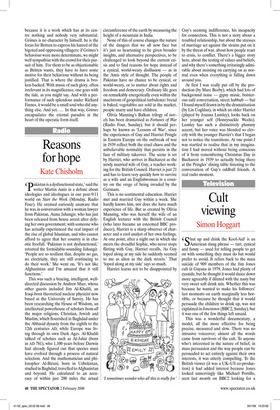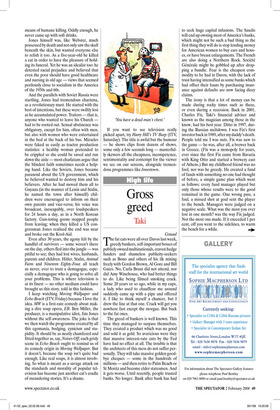Cult viewing
Simon Hoggart
‘Shut up and drink the Kool-Aid’ is an American slang phrase — tart, cynical and funny — used for telling people to get on with something they must do but would prefer to avoid. It refers back to the mass suicide of 909 members of the Jim Jones cult in Guyana in 1978. Jones had plenty of cyanide, but he thought it would sluice down more agreeably if diluted with the nasty but very sweet soft drink mix. Whether this was because he wanted to make his followers’ last moments on earth marginally less horrible, or because he thought that it would persuade the children to drink up, was not explained in Jonestown (BBC2, Sunday), but it was one of the few things left unsaid.
This was a wonderful documentary, a model, all the more effective for being precise, measured and slow. There was no intrusive voiceover; almost all the words came from survivors of the cult. To anyone who’s interested in the nature of belief, in mass persuasion and the way people can be persuaded to act entirely against their own interests, it was utterly compelling. To the British viewer (it was a UK–US co-production) it had added interest because Jones looked unnervingly like Michael Portillo, seen last month on BBC2 looking for a means of humane killing. Oddly enough, he never came up with soft drinks.
Jones himself was, like Webster, much possessed by death and not only saw the skull beneath the skin, but wanted everyone else to relish it too. As a five-year-old he killed a cat in order to have the pleasure of holding its funeral. Yet he was an idealist too: he detested racial prejudice and believed that even the poor should have good healthcare and nursing in old age — views that seemed perilously close to socialism in the America of the 1950s and 60s.
And the parallels with Soviet Russia were startling. Jones had tremendous charisma, as a revolutionary must. He started with the best of intentions, but these were swiftly lost as he accumulated power. Traitors — that is, anyone who wanted to leave his Church — had to be rooted out. Sexual abstinence was obligatory, except for him, often with men, but also with women who were entertained in the bed at the back of his bus. Miracles were faked as easily as tractor production statistics: a healthy woman pretended to be crippled so she could be saved and run down the aisle — most charlatans argue that the blindest faith sometimes needs a helping hand. Like the Soviets, Jones became paranoid about the US government, which he believed wanted to destroy him and his believers. After he had moved them all to Guyana (in the manner of Lenin and Stalin, he named the town after himself) children were encouraged to inform on their own parents and vice-versa; his voice was broadcast, inescapably, over loudspeakers for 24 hours a day, as in a North Korean factory. Gun-toting goons stopped people from leaving; when they killed a US congressman Jones realised the end was near and broke out the Kool-Aid.
Even after 30 years, the agony felt by the handful of survivors — some weren’t there on the day, others fled into the jungle — was pitiful to see; they had lost wives, husbands, parents and children. Hitler, Stalin, Animal Farm and Nineteen Eighty-Four, all teach us never, ever to trust a demagogue, especially a demagogue who is going to solve all your problems. This is where television is at its finest — no other medium could have brought us this story, told in this fashion.
I keep watching Moving Wallpaper and Echo Beach (ITV, Friday) because I love the idea. MW is a first-rate comedy about making a dire soap opera, EB. Ben Miller, the producer, is a manipulative idiot, Jim Jones without the self-awareness. The joke is that we then watch the programme created by all this egomania, bodging, cynicism and stupidity. It should be as neatly chamfered and fitted together as, say, Noises Off; each grisly scene in Echo Beach ought to remind us of its comedy origin in Moving Wallpaper. But it doesn’t, because the soap isn’t quite bad enough. Like real soaps, it is almost involving. So what is meant as a savage attack on the standards and morality of popular television has become just another cat’s cradle of meandering stories. It’s a shame. If you want to see television really picked apart, try Harry Hill’s TV Burp (ITV, Saturday). The title is awful but the humour — he shows clips from dozens of shows, some only a few seconds long — masterfully skewers all the cheapness, incompetence, sentimentality and contempt for the viewer we see on our screens, alongside tremendous programmes like Jonestown.



































































 Previous page
Previous page